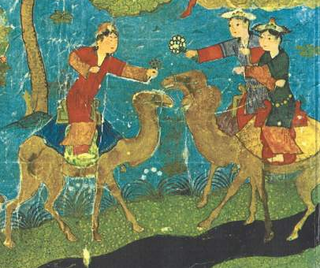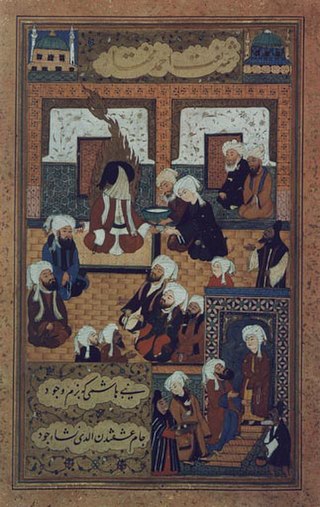
Fiqh is Islamic jurisprudence. Fiqh is often described as the style of human understanding and practices of the sharia; that is, human understanding of the divine Islamic law as revealed in the Quran and the sunnah. Fiqh expands and develops Shariah through interpretation (ijtihad) of the Quran and Sunnah by Islamic jurists (ulama) and is implemented by the rulings (fatwa) of jurists on questions presented to them. Thus, whereas sharia is considered immutable and infallible by Muslims, fiqh is considered fallible and changeable. Fiqh deals with the observance of rituals, morals and social legislation in Islam as well as economic and political system. In the modern era, there are four prominent schools (madh'hab) of fiqh within Sunni practice, plus two within Shi'a practice. A person trained in fiqh is known as a faqīh.

Names of God in Islam are 99 names that each contain Attributes of God in Islam, which are implied by the respective names.

The Quran, also romanized Qur'an or Koran, is the central religious text of Islam, believed by Muslims to be a revelation directly from God (Allāh). It is organized in 114 chapters which consist of individual verses. Besides its religious significance, it is widely regarded as the finest work in Arabic literature, and has significantly influenced the Arabic language. It is the object of a modern field of academic research known as Quranic studies.

In Islam, a houri is a maiden woman with beautiful eyes who is described as a reward for the faithful Muslim men in paradise.
Tafsir refers to an exegesis, or commentary, of the Quran. An author of a tafsir is a mufassir. A Quranic tafsir attempts to provide elucidation, explanation, interpretation, context or commentary for clear understanding and conviction of God's will in Islam.

The Companions of the Prophet were the disciples and followers of Muhammad who saw or met him during his lifetime, while being a Muslim and were physically in his presence.
Injil is the Arabic name for the Gospel of Jesus (Isa). This Injil is described by the Qur'an as one of the four Islamic holy books which was revealed by Allah, the others being the Zabur, the Tawrat, and the Qur'an itself. The word Injil is also used in the Qur’an, the hadith and early Muslim documents to refer to both a book and revelations made by God to Jesus.
At-Tawbah is the ninth chapter of the Quran. It contains 129 verses and is one of the last Medinan surahs. This Surah is known by two names, At-Taubah and Al-Bara'at. It is called At-Taubah in light of the fact that it articulates taubah (atonement) and informs about the conditions of its acceptance.. The name Bara'at (Release) is taken from the opening word of the Surah.
An-Nisa' is the fourth chapter (sūrah) of the Quran, with 176 verses (āyāt). The title derives from the numerous references to women throughout the chapter, including verse 34 and verses 4:127-130.
Naskh is an Arabic word usually translated as "abrogation". In tafsir, or Islamic legal exegesis, naskh recognizes that one rule might not always be suitable for every situation. In the widely recognized and "classic" form of naskh, one ḥukm "ruling" is abrogated to introduce an exception to the general rule, but the text the ḥukm is based on is not repealed.

Islamic feminism is a form of feminism concerned with the role of women in Islam. It aims for the full equality of all Muslims, regardless of gender, in public and private life. Islamic feminists advocate for women's rights, gender equality, and social justice grounded in an Islamic framework. Although rooted in Islam, the movement's pioneers have also utilized secular, Western, or otherwise non-Muslim feminist discourses, and have recognized the role of Islamic feminism as part of an integrated global feminist movement.
Criticism of Islam can take many forms, including academic critiques, political criticism, religious criticism, and personal opinions. Subjects of criticism include Islamic beliefs, practices, and doctrines.
Asma Barlas is a Pakistani-American writer and academic. Her specialties include comparative and international politics, Islam and Qur'anic hermeneutics, and women's studies.
Esoteric interpretation of the Quran is the allegorical interpretation of the Quran or the quest for its hidden, inner meanings. The Arabic word taʾwīl was synonymous with conventional interpretation in its earliest use, but it came to mean a process of discerning its most fundamental understandings. "Esoteric" interpretations do not usually contradict the conventional interpretations; instead, they discuss the inner levels of meaning of the Quran.
An-Nisa 4:34 is the 34th verse in the fourth chapter of the Quran. This verse adjudges the role of a husband as protector and maintainer of his wife and how he should deal with disloyalty on her part. Scholars vastly differ on the implications of this verse, with many Muslim scholars saying that it serves as a deterrent from anger-based domestic violence. The translation of the verse, which can read 'discipline them gently' is also subject to debate among Muslim scholars. According to a hadith transmitted by Abu Huraira, slapping someone across the face was forbidden.
Qur'anic hermeneutics is the study of theories of the interpretation and understanding of the Qur'an, the central text of Islam. Since the early centuries of Islam, scholars have sought to mine the wealth of its meanings by developing a variety of different methods of hermeneutics. Many of the traditional methods of interpretation are currently being challenged with a more modern or contemporary approach. The three primarily established typologies of tafsir are tradition (Sunni), opinion (Shi'i), and allegory (Sufi). The two main types of verses to be interpreted are Muhukmat and Mutashabihat. The traditional approach to hermeneutics within the Qur'an embodies an awareness of isnad. There are many challenges of addressing modern day human rights, women and minority groups through the traditional hermeneutical model.
The Quran states that several prior writings constitute holy books given by God to the prophets and messengers amongst the Children of Israel, in the same way the Quran was revealed to Muhammad. These include the Tawrat, believed by Muslims to have been given by God to the prophets and messengers amongst the Children of Israel, the Zabur revealed to David (Dawud); and the Injil revealed to Jesus (Isa).
Quranism is an Islamic movement that holds the belief that the Quran is the only valid source of religious belief, guidance, and law in Islam. Quranists believe that the Quran is clear, complete, and that it can be fully understood without recourse to the hadith and sunnah. Therefore, they use the Quran itself to interpret the Quran, an exegetical principle known as tafsir al-Qur'an bi al-Qur'an.
Hermeneutics of feminism in Islam is a system of interpreting the sacred texts of that religion, the Quran and Sunnah. Hermeneutics is the theory and methodology of interpretation, especially of sacred texts, and Islamic feminism has a long history upon which to draw. Muslim feminists reinterpret gendered Islamic texts and challenge interpretive traditions to promote the ideas of gender equality.






